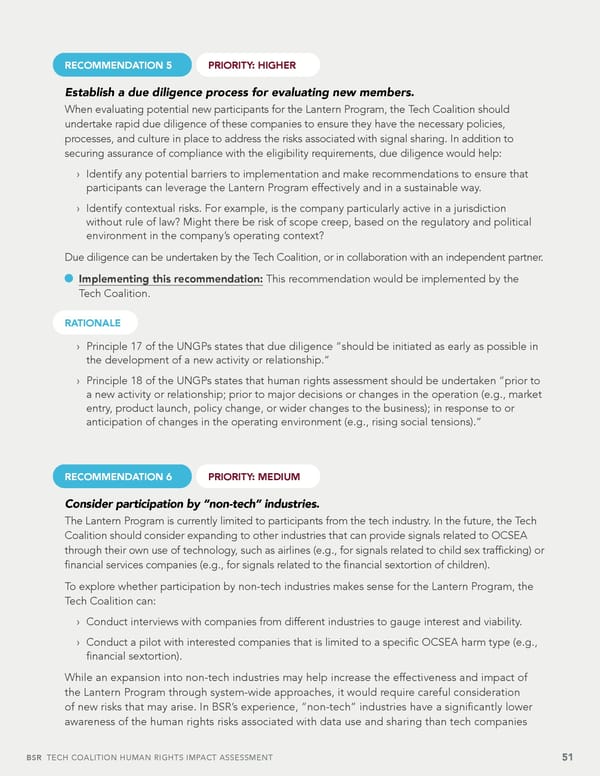RECOMMENDATION 5 PRIORITY: HIGHER Establish a due diligence process for evaluating new members. When evaluating potential new participants for the Lantern Program, the Tech Coalition should undertake rapid due diligence of these companies to ensure they have the necessary policies, processes, and culture in place to address the risks associated with signal sharing. In addition to securing assurance of compliance with the eligibility requirements, due diligence would help: › Identify any potential barriers to implementation and make recommendations to ensure that participants can leverage the Lantern Program effectively and in a sustainable way. › Identify contextual risks. For example, is the company particularly active in a jurisdiction without rule of law? Might there be risk of scope creep, based on the regulatory and political environment in the company’s operating context? Due diligence can be undertaken by the Tech Coalition, or in collaboration with an independent partner. Implementing this recommendation: This recommendation would be implemented by the Tech Coalition. RATIONALE › Principle 17 of the UNGPs states that due diligence “should be initiated as early as possible in the development of a new activity or relationship.” › Principle 18 of the UNGPs states that human rights assessment should be undertaken “prior to a new activity or relationship; prior to major decisions or changes in the operation (e.g., market entry, product launch, policy change, or wider changes to the business); in response to or anticipation of changes in the operating environment (e.g., rising social tensions).” RECOMMENDATION 6 PRIORITY: MEDIUM Consider participation by “non-tech” industries. The Lantern Program is currently limited to participants from the tech industry. In the future, the Tech Coalition should consider expanding to other industries that can provide signals related to OCSEA through their own use of technology, such as airlines (e.g., for signals related to child sex traf昀椀cking) or 昀椀nancial services companies (e.g., for signals related to the 昀椀nancial sextortion of children). To explore whether participation by non-tech industries makes sense for the Lantern Program, the Tech Coalition can: › Conduct interviews with companies from different industries to gauge interest and viability. › Conduct a pilot with interested companies that is limited to a speci昀椀c OCSEA harm type (e.g., 昀椀nancial sextortion). While an expansion into non-tech industries may help increase the effectiveness and impact of the Lantern Program through system-wide approaches, it would require careful consideration of new risks that may arise. In BSR’s experience, “non-tech” industries have a signi昀椀cantly lower awareness of the human rights risks associated with data use and sharing than tech companies BSR TECH COALITION HUMAN RIGHTS IMPACT ASSESSMENT 51
 Tech Coalition Human Rights Impact Assessment of the Lantern Program Page 50 Page 52
Tech Coalition Human Rights Impact Assessment of the Lantern Program Page 50 Page 52